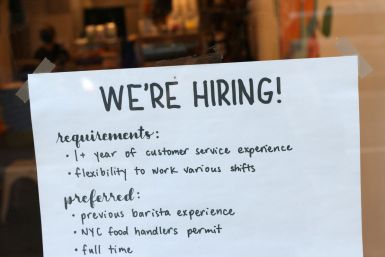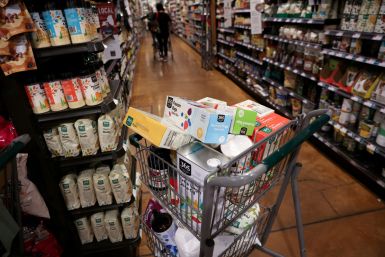Whether they are selling burgers, pizza or pancakes, major U.S.
In 2019, the U.S. unemployment rate averaged 3.7% and consumer prices rose at an annual rate of around 1.8%.
The message from the world's top finance chiefs is loud and clear: rampant inflation is here to stay and taming it will take an extraordinary effort, most likely a recession with job losses and shockwaves through emerging markets.
India likely recorded strong double-digit economic growth in the last quarter but economists polled by Reuters expected the pace to more than halve this quarter and slow further toward the end of the year as interest rates rise.
Asian shares slid on Monday as the mounting risk of more aggressive rate hikes in the United States and Europe shoved bond yields higher and tested equity and earnings valuations.
"Don't fight the Fed" is a well-worn market maxim, and hedge funds are sticking to it like glue.
Bank of Korea Gov. Rhee Chang-yong said Saturday interest rates would need to continue increasing until inflation is in decline, but the country likely could not call a halt to its tightening cycle before the U.S.
Cleveland Federal Reserve Bank President Loretta Mester on Saturday said she would base her decision on whether to back a third straight 75-basis point interest rate hike next month on U.S.
Mexican officials hope a newly created state-run lithium company will catapult the country to the vanguard of the green energy revolution, but industry experts told Reuters hefty costs and international indifference are likely to stymie those plans.
Investors are bracing for higher interest rates for longer and hunkering down with defensive portfolios which shun high equities risk, as U.S.
The coronavirus pandemic touched off a scramble among U.S.
U.S. consumer spending barely rose in July as a drop in gasoline prices weighed on receipts at service stations, but monthly inflation slowed down considerably, which could give the Federal Reserve room to scale back its aggressive interest rate hikes.
The S&P 500 and the Nasdaq were subdued on Friday in early trading as investors were nervous about hawkish signals from Federal Reserve Chair Jerome Powell at the annual Jackson Hole symposium amid fears of slowing economic growth.
Hungary's central bank is expected to raise its base interest rate by 100 basis points to 11.75% next Tuesday, with more hikes to come this year as inflation keeps rising due to surging energy prices and a weak forint.
Consumer morale in the euro zone's two biggest economies diverged starkly in August as French consumers benefited from fresh government measures while concerns over rising energy bills hit their German counterparts, surveys showed on Friday.
India's economy is forecast to have expanded by an annual 15.2% in the April-June quarter, thanks to a weak base last year and a rebound in consumption as pandemic restrictions eased, a Reuters poll found.
Longfor Group said its 1.5 billion yuan ($219 million) bonds had been priced at a coupon rate of 3.3%, marking the first sale by a private Chinese homebuilder of notes fully guaranteed by the state to boost market sentiment amid a sector-wide cash crunch.
If "raise and hold" sounds like a poker strategy, that may in fact sum up the all-in approach to fighting inflation that Federal Reserve Chair Jerome Powell is expected to lay out in a highly anticipated speech to the Jackson Hole central banking conference on Friday.
Japanese wages are unlikely to grow as much as nationwide consumer prices over the coming year, almost 80% of economists said in a Reuters poll, which would be bad news for an economy that has hardly seen any real wage growth for more than two decades.
Oil prices rose in early trade on Friday on signs of improving fuel demand, though gains were capped as the market awaited clues from the U.S.
Wall Street's main regulator on Thursday voted to adopt a measure requiring that U.S.-listed companies disclose how the pay of their top executives squares with overall company performance.
The U.S. dollar surged this year to its highest in two decades and there are still plenty of bulls betting the greenback has legs to keep climbing thanks to a hawkish Fed and economic news that should keep America ahead of other major economies.
U.S. consumers are responding to surging prices for new cars and trucks by going deeper into debt, pushing the average new vehicle loan to a record-high $40,290 during the second quarter, credit monitoring company Experian said Thursday.
Australia will have to invest in renewable energy and carbon capture and storage at unprecedented speed and scale in order for the economy to achieve net zero carbon emissions by 2050, modelling released on Thursday showed.
Some of China's state-backed financial institutions are pushing back on Beijing's calls to support the embattled property sector due to concerns about the impact of such exposure on their balance sheets, seven people with knowledge of the matter said.
Australia's companies are split, with big miners and airlines expecting higher profits on soaring commodities prices and a rebound from COVID-19, while supermarkets, banks and manufacturers are hurt by inflation and stagnant wages.
Asian share markets were broadly positive while the dollar was slightly weaker on Thursday, with investors nervously awaiting the U.S.
On paper, T.J. Semanchin's Wonderstate Coffee business seems more productive than ever, with fewer workers generating higher sales at the company's three cafes and wholesale roastery in Wisconsin.
The U.S. dollar edged back from near a two-decade peak against a basket of major currencies on Thursday as investors looked to a speech by Federal Reserve Chair Jerome Powell the following day for fresh clues on the path for monetary policy.
Argentina is considering asking for an International Monetary Fund loan under its new Resilience and Sustainability Trust (RST), designed to help countries ensure sustainable growth, a source with direct knowledge told Reuters on Wednesday.



















































